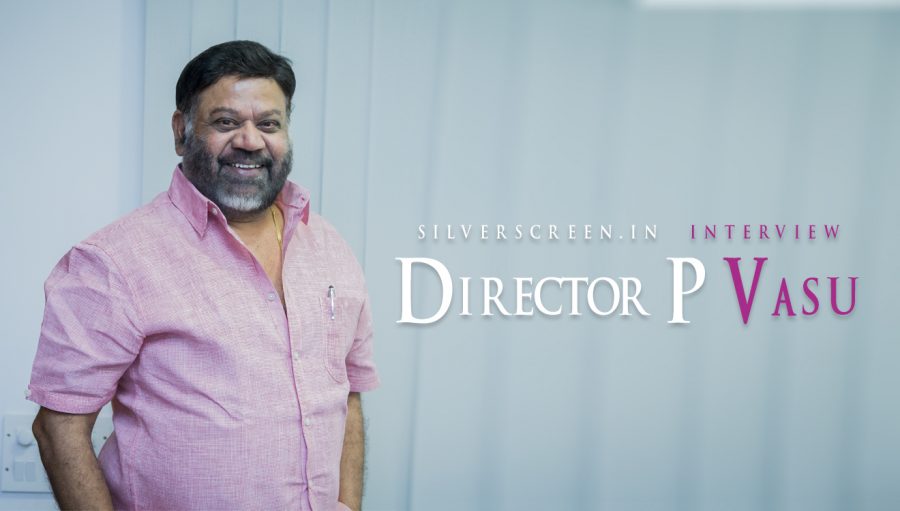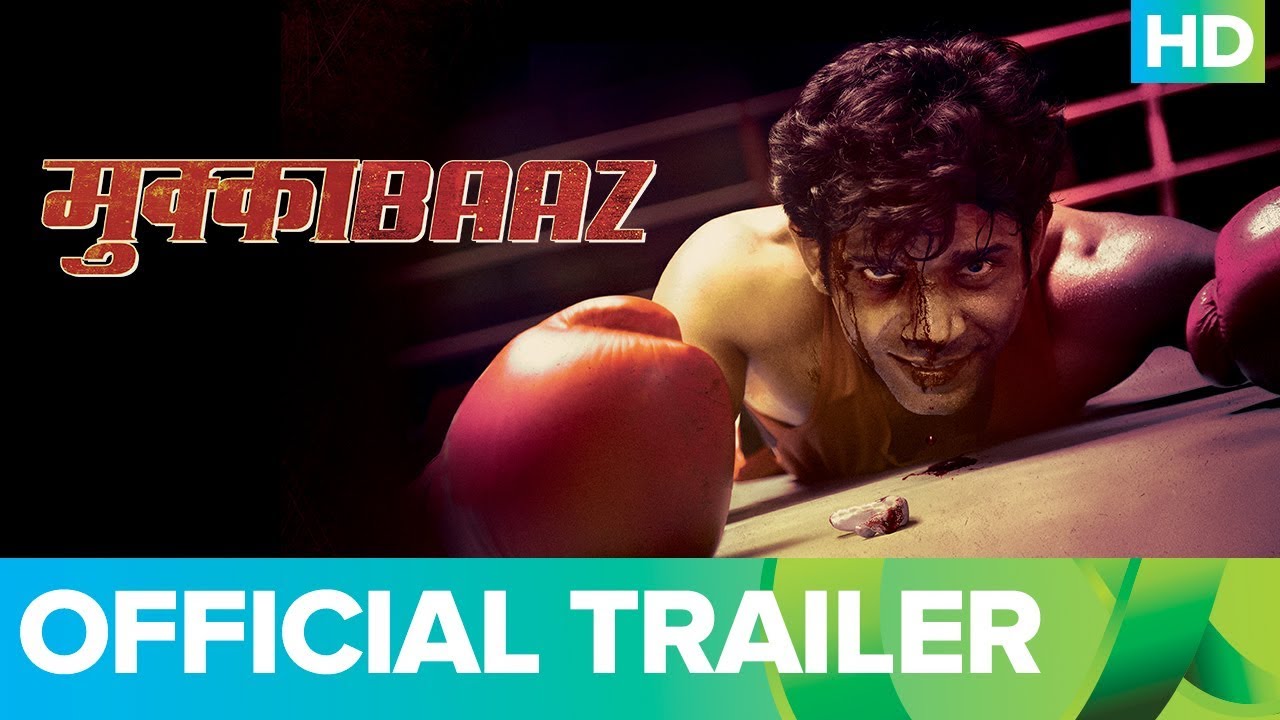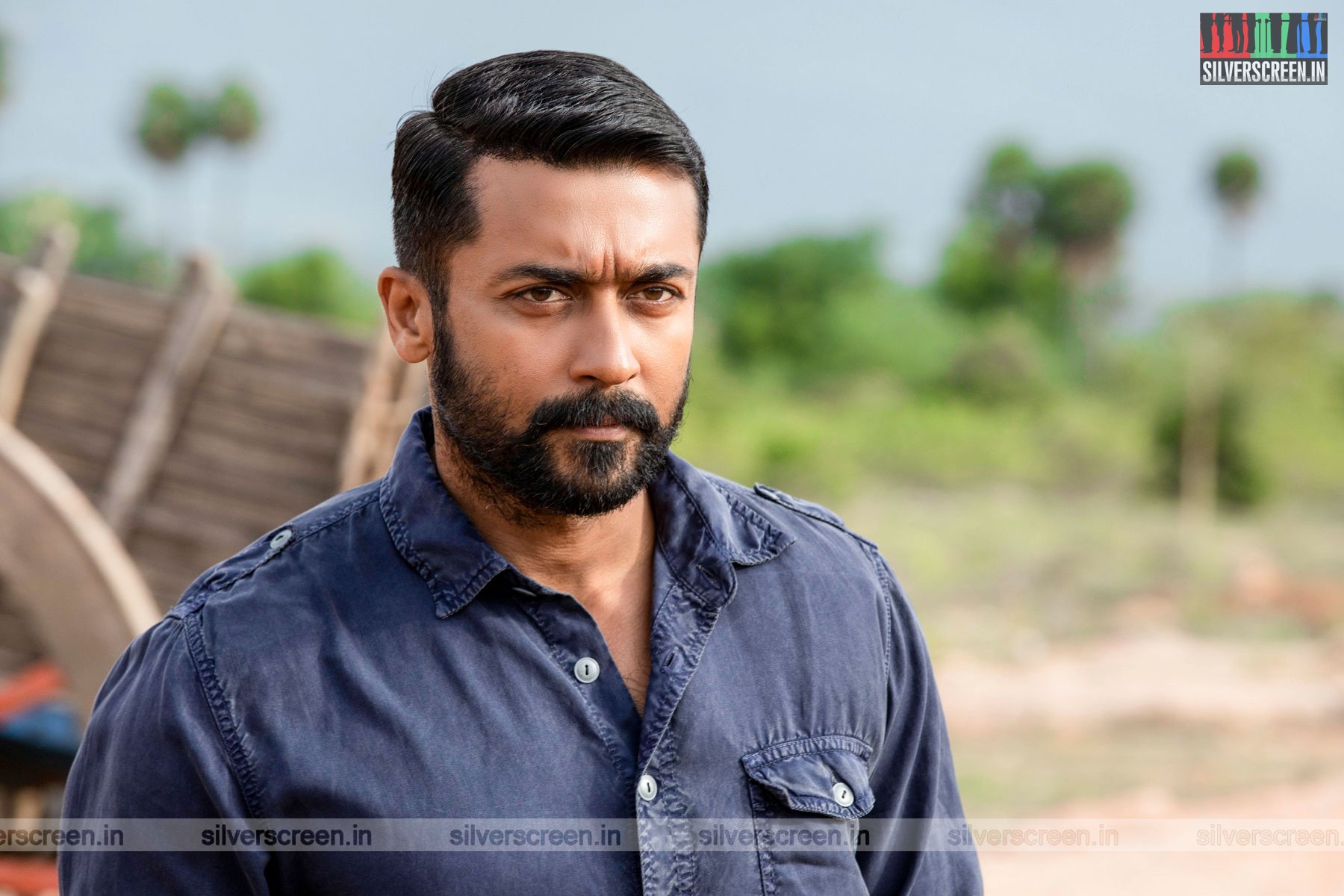P Vasu is a man of many metaphors. He’s also one for symbolism. When he shot Walter Vetrivel – his 1993 movie with Sathyaraj, he had Rajinikanth turn clapper for the first shot, while Vijayakanth directed the first scene, and Prabhu switched on the camera. Or so Wikipedia says. But it’s something that I’d believe of him.
To Vasu, his films are his babies. He declares this without a trace of humour. “Like how a baby develops in the womb,” he says, “and after birth, crawls, stands, and finally walks – my scripts, too, develop the same way.”
The audience is the doctor, Vasu nods solemnly. “They decide whether my baby is healthy or sick.”
1
Walter Vetrivel hit theatres on Pongal day in 1993. It was a blockbuster. Sathyraj is a police officer, while Sukanya is a thief whom he later marries. Halfway through the movie, P Vasu has a blind Sukanya feed her baby some (unintentionally) poisoned milk. The scene, heavy on emotion, with the score veering from ’90s sinister to thumping (to announce Walter Vetrivel’s race against time), has Sukanya dressed in pristine white, hair falling to her waist. Just as she’s about to drink the milk, the baby cries – on cue. Later, she sings him to sleep with a lullaby, as the camera pans to the now nearly-empty bottle, gently dripping milk as Walter Vetrivel, who arrives belatedly on the scene, looks on in horror.
An Ilaiyaraaja musical, the movie had become one of Sathyaraj’s hits of the ’90s.
P Vasu, on the other hand, had become adept at invoking the sure-as-fire mother-baby sentiment to touch his audience. In an unconsciously progressive move, he had Prabhu sing a famous lullaby in the movie Chinna Thambi (1991) – which, otherwise, was filled with masculine virility, and little to less dignity accorded to women, in true ’90s fashion. In Chinna Thambi, a film about a girl, much celebrated and reviled at the same time because the astrologers predicted she would have a will of her own, Vasu has the villains desecrate the ‘sanctity’ of a widow (Manorama), CT’s mother, in the climax. CT (Prabhu) arrives in time to knock the villain down, as a splash of muddy water symbolically erases the smudge of red on her forehead, thus ‘restoring’ her to lovely, glorious widowhood. The sequence is agonizingly slow.
I question Vasu about the plight of women in his movies. “The heroine is the heart of the film,” he declares seriously, “just as the hero is the head, and the technicians are the intestines and kidneys….”
He doesn’t really talk in metaphors all the time, of course. This was, Vasu says, just to make me understand the “nuances” through “simple examples”.
Meanwhile, Chinna Thambi too had released to much acclaim; a song in the film “Povoma Oorgolam“, in Swarnalatha’s voice set to Ilaiyaraaja’s tunes, earned the late singer some much needed recognition. And a Tamil Nadu State Award for Best Female Playback (1991). Vasu was named Best Director, while Prabhu and Khushboo were named Best Actor and Best Actress.
The lullaby “Thooliyile Aada Vandha” to which Vasu was obviously partial to, was available in two different versions – as was the trend back then. One sung by Mano, and the other, by Chithra.
*****
Vasu experimented quite a bit with his well-loved theme; he switched babies with adult-children, and subverted the lullaby too – as a consecration of motherhood.
The director’s caller tune – when I ring him – is “Amma Endru Azhaikadha” from Rajinikanth’s Mannan (1992). A song which, Vasu admits, moves him even 26 years after its release. The song sequence, sung by KJ Yesudas, is about a son helping his recently-paralyzed mother. It was new at that time – especially to Rajinikanth who was used to foot-tapping numbers, or duets as a Superstar. “When Rajini asked me why I brought in a soft song about mothers, I simply said that I wanted my grandmother to think of her mother when she listens to this song,” says Vasu, “She shed a tear even at the age of 80 when she listened to it. My mother, who had watched all my films, unfortunately wasn’t around as she had passed away.”
Panakkaran (1989) was Vasu’s first film with Rajini. A remake of the Hindi film Lawaaris starring Amitabh Bachchan, the Tamil version starred Gauthami and Janagaraj, among others. An Ilaiyaraaja musical, like many before, and many after, it was considered a successful project; a song in Ilaiyaraaja’s voice, and a hit.
2
“My career began in Kamal Haasan’s house, though,” declares P Vasu. “I knew him before Rajini. A lot of story discussions used to happen at his place. Charu Haasan’s wife would make lunch for us, and we’d spend hours talking about the script.”
Those were the days of Bharathi-Vasu, when the duo was working on Panneer Pushpangal. “Kamal was supposed to work with us, but he was busy. I remember him telling me that the subject should be the hero. And if that cannot happen, it could be someone else.”
Decades later, the friendship continued. “It’s not that we’ve never worked together,” Vasu adds after a thought, when asked about not having done a film with Kamal, “I look at it this way: we’ll work together someday.”
*****
Cinema is in his blood, says Vasu – as dramatic as his films. As a child, he would tell everyone that his blood group was C +ve. “C is for Cinema, you know,” he adds helpfully.
Vasu’s father, Peethambaram Nair, worked as a make-up artiste for MGR and NTR. “I would see actors walk in looking plain, and then walk out as MGR and Sivaji Ganesan,” he recalls. “These actors would try on different wigs and hairstyles often. Even before I understood what cinema was, I’d watch an MGR or Sivaji film, and see myself in them. I’d walk out of the theatre feeling like them, and so I’d wear different wigs to school. Sure, people would call me a fool, but I was so involved.” Once, he’d torn up one of his mother’s pretty nylon saris and fashioned a shirt from it.
“I got into trouble for that,” he says, “but I felt like a star.”
And that’s how Vasu came to love peculiar characters – his movies are full of them, memorable people he would have met long, long ago.
*****
The director, in his 30-year-long well-storied career, has made films with almost all of the ’90s stars except Kamal. The late actor Murali, though, is someone whom the director would have loved to work with. “He was a wonderful actor,” says Vasu, “He had his own style amidst a host of other actors. He was not utilized well by his directors. But it’s good to see his son Atharvaa on screen. I’d definitely like to work with him in future.”
Another missed opportunity that Vasu rues was the one with Aishwarya Rai Bachchan. Aishwaryavum Aayiram Kaakavum was announced with much fanfare three years ago. Vasu, according to reports, had said she would play the role of a Kalaripayattu fighter. “I went to meet her in Mumbai along with Sax of Sun TV and producer Ramesh,” he recalls, “She liked the script when we narrated it to her. We were supposed to begin with Hindi, and then, Tamil and Telugu. But, Aishwarya felt Tamil and Telugu would be better. She hadn’t decided on the film yet, but unsolicited publicity and a bunch of reports did the rounds, leaving most people in the project disturbed.”
Vasu plans to reopen the project this year with a new person in the lead. His other upcoming projects include one with Balakrishna in Telugu. “It’s a big one and will definitely take me seven to eight months to work on. And I might be planning one more with Lawrence.”
Is Raghava Lawrence a favourite now?
“He did a good job in Kanchana and Muni,” explains Vasu, “so I could see him do a better job in Shivalinga. He was perfect for the role. For instance, I couldn’t have cast Rajini in Chinna Thambi. Prabhu was the proper hero for it.”
Shivalinga – releasing tomorrow – is based on a true story, he says. “Heard it when I was in school – just a line. But, ultimately, the movie is about how a dead man finds out who killed him.”
Vasu uses silence to accentuate the mystery in his movies. He loves the way it sounds.
“When I go about a story, I imagine my sounds first. With Shivalinga, I imagined the sounds a haunted house would make. While that matters a lot, so does silence. When there’s silence in a scene, the audience invest in the story.”
Recommended
They get curious, he says. “Shivalinga is about a murder that happens. The evidence for the murder is only the audience. Nobody knows why the boy was killed; he wasn’t even a problematic character. So that’s my first element of curiosity. Why him?”
The second element, Vasu adds, is a “dove”.
The only witness to the murder.
Otherwise, it’s a typical P Vasu film, he assures me. “Entertainment guaranteed. I’m keen on comedy and family sentiments, you know. Emotions are universal, but when you watch my films, you are entering my house, meeting my family – you might even relate to some events….”
*****
The P Vasu interview is a Silverscreen exclusive.



